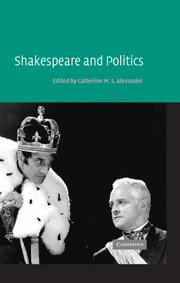Book contents
- Frontmatter
- Contents
- List of contributors
- Editor's note
- 1 Shakespeare and politics: an introduction
- 2 Shakespeare and politics
- 3 Henry VIII and the deconstruction of history
- 4 Livy, Machiavelli, and Shakespeare's Coriolanus
- 5 Richard II and the realities of power
- 6 Plutarch, insurrection, and dearth in Coriolanus
- 7 Some versions of coup d'état, rebellion, and revolution
- 8 Language, politics, and poverty in Shakespearian drama
- 9 ‘Demystifying the mystery of state’: King Lear and the world upside down
- 10 Venetian culture and the politics of Othello
- 11 The Bard and Ireland: Shakespeare's Protestantism as politics in disguise
- 12 Henry V as working-house of ideology
- 13 ‘Fashion it thus’: Julius Caesar and the politics of theatrical representation
- 14 Take me to your Leda
- 15 Macbeth on film: politics
- 16 William Shakespeare's Romeo + Juliet: everything's nice in America?
- Index
1 - Shakespeare and politics: an introduction
Published online by Cambridge University Press: 05 June 2012
- Frontmatter
- Contents
- List of contributors
- Editor's note
- 1 Shakespeare and politics: an introduction
- 2 Shakespeare and politics
- 3 Henry VIII and the deconstruction of history
- 4 Livy, Machiavelli, and Shakespeare's Coriolanus
- 5 Richard II and the realities of power
- 6 Plutarch, insurrection, and dearth in Coriolanus
- 7 Some versions of coup d'état, rebellion, and revolution
- 8 Language, politics, and poverty in Shakespearian drama
- 9 ‘Demystifying the mystery of state’: King Lear and the world upside down
- 10 Venetian culture and the politics of Othello
- 11 The Bard and Ireland: Shakespeare's Protestantism as politics in disguise
- 12 Henry V as working-house of ideology
- 13 ‘Fashion it thus’: Julius Caesar and the politics of theatrical representation
- 14 Take me to your Leda
- 15 Macbeth on film: politics
- 16 William Shakespeare's Romeo + Juliet: everything's nice in America?
- Index
Summary
Current developments in Shakespeare criticism expose us to the appropriation and adaptation of the playwright's work across an ever-reconfiguring array of contextual fields and a variety of media, including film, television and, most recently, the internet. Yet, even among those critics who confine themselves to a more traditional definition of politics, no small part of the politics of reading Shakespeare continues to come from the struggle for meaning that occurs at the level of the text. The playwright's oeuvre sustains a productive interpretative ambiguity which defies each new critical paradigm that attempts to corner or limit it. And it is here of course, amid the contingencies that inform our critical practice, as well as our appreciation and reception of the plays themselves, that the transformational possibilities of ‘Shakespeare’ could truly be said to reside. In short, the very endurance of the dramatist's work is clearly related to its ability to withstand interpretations that are often politically contestable or diametrically opposed; and in some sense, it is precisely this ‘lack of fit’ which has continued to ensure Shakespeare's corpus its socio-political significance.
As a result, over the last four hundred years the playwright has been adopted by almost every faith, political hue and persuasion. Yet paradoxically these attempts to bind Shakespeare to an individual cause – neo- Conservative, Protestant, Catholic, Republican, Liberal, Tory, Marxist, high Anglican, and so on – only serve to confirm that the plays and poems remain irreducible to a particular context or a uniform party-political position.
- Type
- Chapter
- Information
- Shakespeare and Politics , pp. 1 - 21Publisher: Cambridge University PressPrint publication year: 2004
- 2
- Cited by

